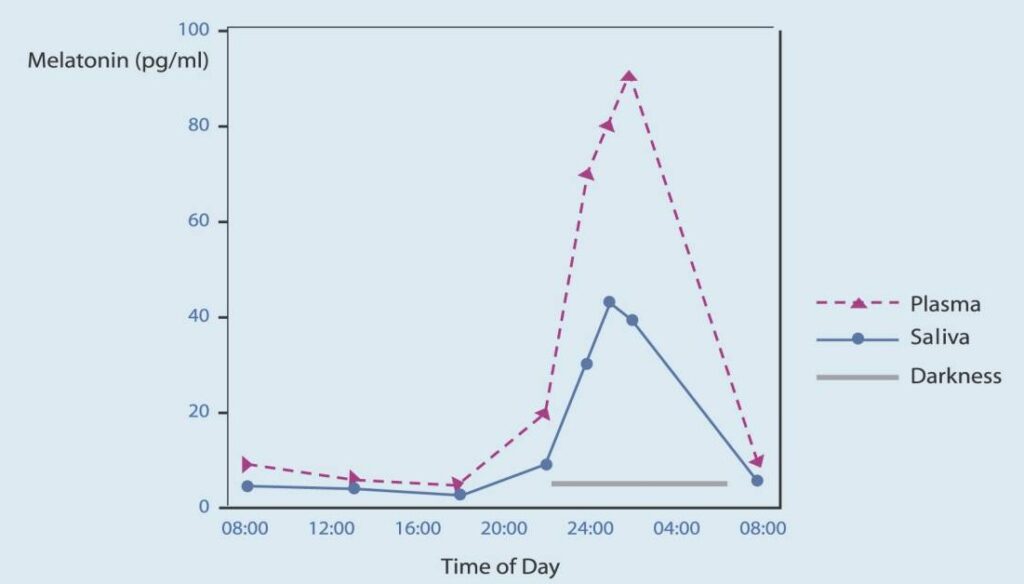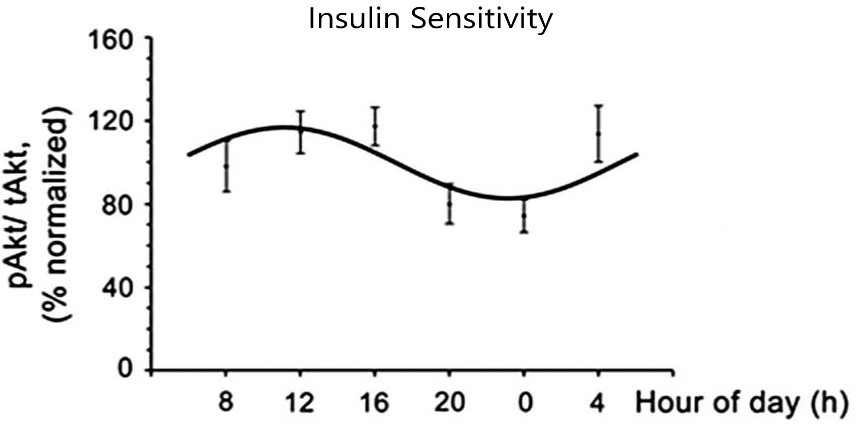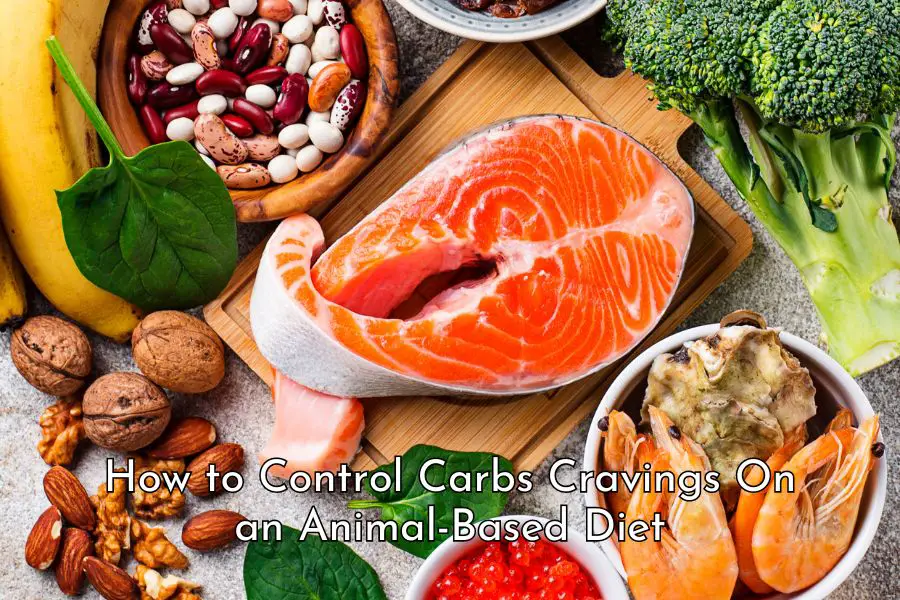If you have just one meal a day, would you be better off eating at lunch time or at dinner time? If you eat more than once a day, does it matter whether you eat a big breakfast or a big dinner?
It turns out meal timing does matter and, in addition to what you eat, when you eat can have a significant impact on your health.
Available evidence shows that the best time to eat is during the daytime when you are active and are exposed to natural light. It is also best to consume most of your calorie intake around midday when your insulin sensitivity is at its peak and not to eat very early in the morning, close to your bedtime, or late at night when your insulin sensitivity is low.
Below, we will look at the reasons for this recommendation from the evolutionary perspective and from the angle of scientific evidence as well as some potential adverse impacts on health due to poor meal timing.
Our ancestors’ meal timing
For billions of years, the sun was the only source of light on Earth and, as a result, life here has evolved to adapt to the 24-hour solar cycle.
And for millions of years, our ancestors’ lives were also in sync with the cycle of the sun.
They got up at sunrise, hunted, gathered food, built shelters, collected water, cooked and ate during the daytime, and rested and slept during nighttime.
It would have been difficult if not impossible for them to eat or carry out other activities apart from sleeping after dark.
As a result, through million years of evolution, the human body and its innate circadian rhythm have evolved to correspond to the rhythm of the sun.
Our sleep and wake cycles, digestive systems, hormone releases and heart function are set to work in perfect harmony with night and day cycles.
As we will explore in the next section, there will be detrimental impacts on our health if our daily routine including our eating routine becomes out of sync with the natural light-dark cycles.
Therefore, the first thing we can agree upon is it’s best to eat when we are most active and when we have exposure to the natural light, like the way our ancestors did for millions of years.
This is consistent with what scientific evidence shows that we will explore in the section below.
Melatonin, insulin sensitivity and when is the best time to eat
Melatonin
Melatonin is a hormone that your brain produces in response to darkness. [1]
Melatonin controls the sleep-wake patterns and the general day and night cycles of your body.
When you are exposed to light, your melatonin level is low and you feel awake. When it gets dark, your melatonin level is high and that helps you fall asleep.
The graph below shows how melatonin levels fluctuate during a 24-hour period.

As can be seen in the above graph, melatonin levels vary widely between day and night. [2]
Melatonin production is extremely low during the daytime between around 8 a.m. and 6 p.m. and then begins to rise as night falls.
Melatonin levels peak at just after midnight before beginning to fall again during the second half of the night.
Melatonin is not just a hormone to regulate circadian rhythms, sleep-wake cycles and reproduction, it also has an important role in regulating glucose metabolism.
A study has found that large doses of melatonin administered to healthy young men during the daytime reduced their insulin sensitivity or glucose tolerance by about 10%. [3]
Insulin sensitivity
Insulin sensitivity refers to how responsive your cells are to insulin.
High insulin sensitivity means the cells in your body respond well to insulin and are more effective at absorbing and reducing blood sugar.
Low insulin sensitivity means the cells in your body don’t respond well to insulin and are not as effective at absorbing blood sugar, resulting in high blood sugar levels.
Similar to melatonin, insulin sensitivity in humans has been found to vary significantly depending on the time of day. [4, 5, 6]
As shown in the graph below, insulin sensitivity is higher in the morning than in the evening and night.

The inverse relation between melatonin and insulin sensitivity
Clearly, melatonin has an inverse relationship with insulin sensitivity.
During the day, melatonin levels remain low because of the exposure to natural light, whereas your insulin sensitivity remains high and reaches its peak at around noon.
With the onset of darkness, melatonin levels begin to increase and insulin sensitivity begins to decline accordingly and dips to the lowest level in the middle of the night.
This means your body is best at metabolizing food earlier in the day, especially around mid-day because this is when you are most insulin sensitive. [7, 8]
A study has found that insulin sensitivity in adipose tissue reached its maximum value around noon and was 54% higher than that at midnight, which is a huge difference. [9]
It should be noted that, when you are on the carnivore diet, carbohydrate intake is minimal and insulin sensitivity might not seem like a critical issue.
However, when you are most insulin sensitive also happens to be when your melatonin level is at its lowest. Because melatonin has been found to inhibit gastric acid release, when melatonin is at its lowest, your body is also best able to produce gastric acid for digestion.
Melatonin has even been used as an alternative to proton pump inhibitors (drugs to induce a pronounced and long-lasting reduction of gastric acid production in GERD patients) because of its similar ability to inhibit gastric acid secretion. [10]
The best time to eat in theory
Because you are more insulin sensitive during the daytime than in the evening and at night, it’s best to eat during the daytime when your body is able to absorb blood glucose better and is better able to produce gastric acid for digestion.
Furthermore, it would also make sense to consume most of your calorie intake around noon time when your insulin sensitivity is at its peak.
In addition, because melatonin remains relatively high early in the morning until around 8 a.m., it’s best not to eat early in the morning or immediately after waking up before you have the chance to immerse yourself in natural light, lower the melatonin level and increase insulin sensitivity accordingly. [11, 12]
Clearly, it is not a good idea to eat later in the evening and late into the night when your insulin sensitivity is at its lowest and your body isn’t able to absorb glucose as effectively.
Eating late also means you can’t have a fully rested sleep because your body is still busy digesting.
In addition, because you would generally sleep and wouldn’t be active during the night, most of what you consume would be stored as fat.
Overall, the best time to place your meals is during the active phase of your day from the morning (about an hour after waking up) to the afternoon (a few hours before your bedtime) and it’s best to consume most of your calorie intake in the earlier part of the day. [13]
This is generally in line with our ancestors’ eating patterns discussed above.
If you eat just one meal a day, the ideal would be to eat this one meal at around noon when your insulin sensitivity is at its highest.
If you eat more than one meal a day, it’s best to place the main meal at around noon and smaller meals in the morning and early afternoon.
If the above is not possible due to work commitments or social obligations, try to consume your meals during daylight hours which was what our ancestors and modern humans did until around 150 years ago, after the invention of artificial light.
Also try to eat at least 3 hours before bedtime so that, by the time you are asleep, your body is not busy digesting and can have a proper restorative rest when important repair and maintenance work can be carried out.
Consequences of misalignment between circadian rhythm and meal-timing
Available evidence indicates that, when there are misalignments between the innate circadian rhythms and external rhythms, there can be several adverse health consequences.
Eating when melatonin levels are high (e.g. eating at night) can adversely influence glucose metabolism in humans, i.e. impairs glucose tolerance and increases the risk of insulin resistance. [14]
On the other hand, eating when melatonin levels are low (e.g. eating during the day) does not negatively affect glucose tolerance. [15]
Furthermore, fasting when melatonin levels are high has been shown to facilitate the recovery of β-cells which are unique cells in the pancreas responsible for making insulin. [16]
Circadian misalignments such as eating late, eating at night, daytime sleep and nighttime wake by shift workers, night eaters, melatonin users, or people with irregular eating patterns can increase risks of weight gain, obesity, diabetes, liver diseases, cardiovascular diseases, cancers, digestive diseases, sleep disorders, inflammation, and depression. [17, 18, 19, 20, 21]
Having late dinner (within 2 hours of bedtime) can decrease glucose tolerance and eating within 2 hours of bedtime can increase the probability of being obese 5 times. [22, 23]
In contrast, high caloric intake earlier in the day (2 hours after wake time), can decrease the probability of being obese by 50%. [24, 25]
Just having late lunch (after 3 p.m.) has been found to hinder weight loss and cause damaging effects on microbiota diversity and composition. [26]
A study has also found that high-calorie breakfast coupled with low-calorie dinner is better for weight loss than low-calorie breakfast and high-calorie dinner. [27]
You will also burn a lot more calories following a morning meal than an evening meal. [28]
Conclusion
In summary, based on available evidence, you should:
- Avoid eating immediately after waking up or very early in the morning because your melatonin level is still high. It’s better to get outside first, soak up some natural light and let your body slow down melatonin production and increase insulin sensitivity accordingly
- Consume most of your calories earlier in the day, ideally around mid-day which is when your insulin sensitivity is at its peak
- Avoid eating late in the evening or into the night when melatonin levels increase and your insulin sensitivity declines. During this time, digestion is poor, sleep is disrupted, and most energy consumed will be stored as fat
- If your goal is weight loss, consume most of your calorie intake earlier in the day when your metabolic rate is high. Eat a light dinner or skip dinner altogether if you are not hungry.
Once you’ve established an eating routine that suits you best, try to stick to this routine. Big and sudden changes to your daily routine are akin to metabolic jetlag and are not good for your health.
While this post is written for the carnivore diet audience, the above meal timing practice should apply regardless of whether you are on the carnivore diet or not.
If you find this post helpful, please consider sharing this post and my site with your family, friends, and followers. That would be much appreciated. Please also check out my library of articles on the carnivore diet here which is updated regularly.
Disclaimer: The information in this post is for reference purposes only and not intended to constitute or replace professional medical advice. Please consult a qualified medical professional before making any changes to your diet or lifestyle.





